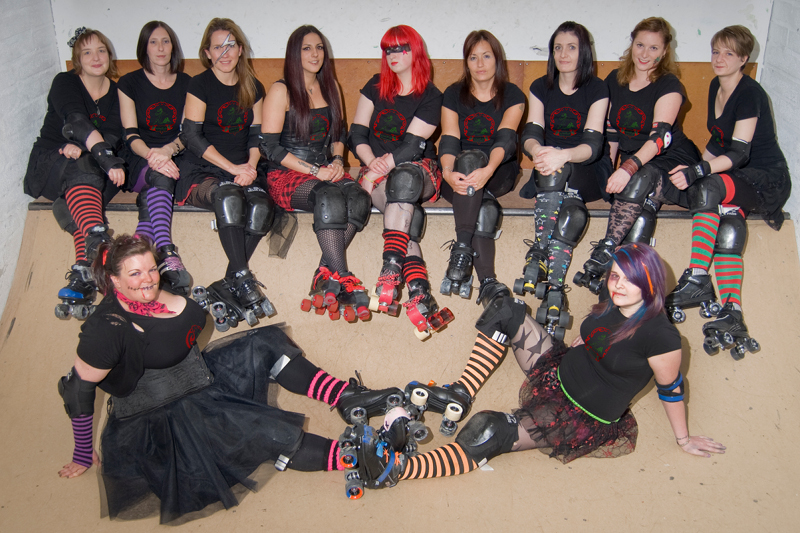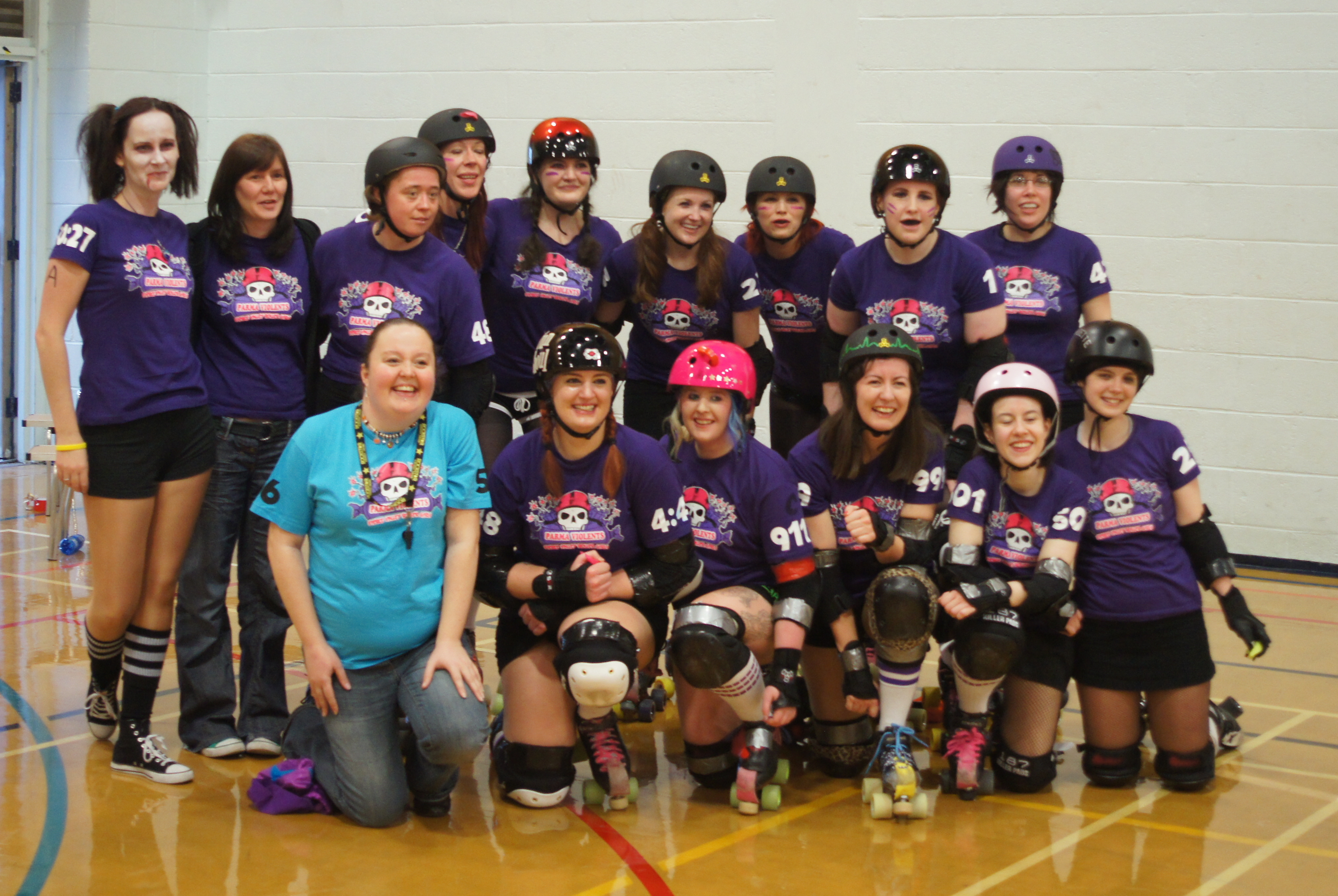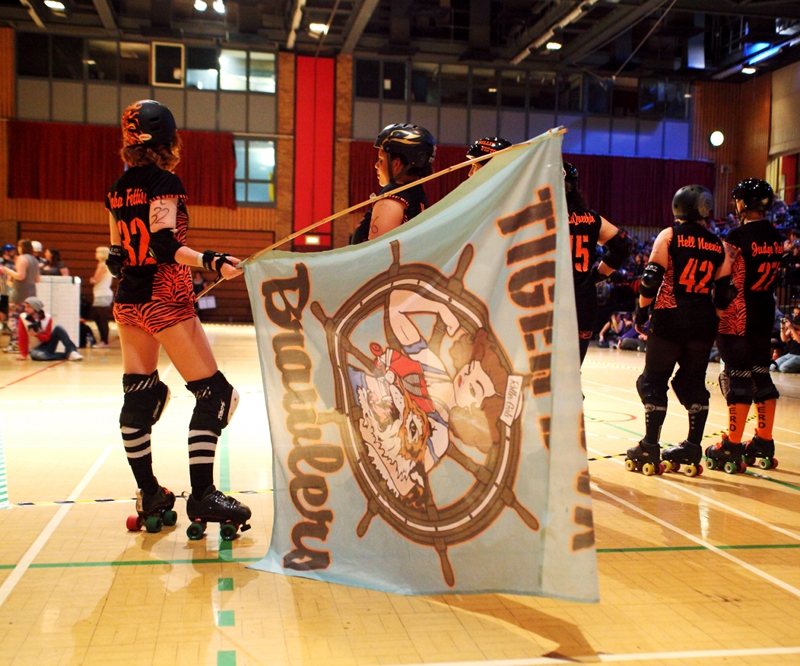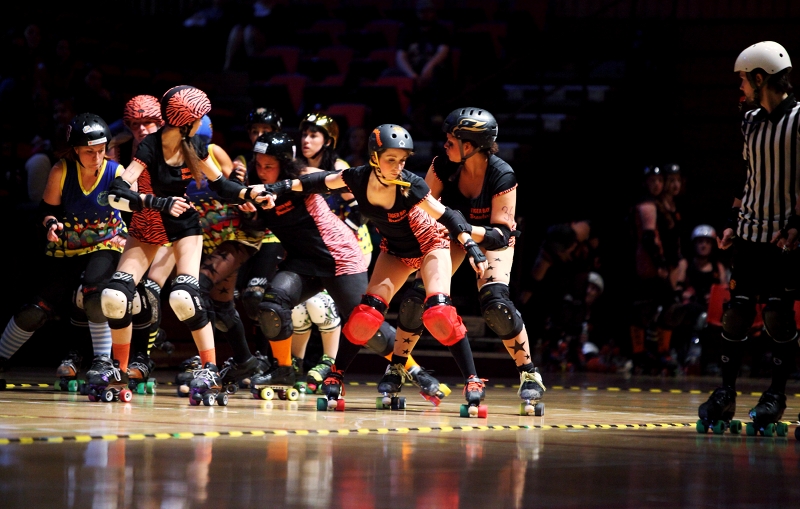"Brave New Faces" (The Writer's Cut)
In many ways, it’s easier to face these challenges now than it was back in 2006 when London Rollergirls were just getting started. There’s a vast array of established UK leagues, all keen to help those starting out. Every league has nothing but praise for the support they received from the existing roller derby community. “I definitely could not have done it without them,” says Aby of the Leeds and Manchester leagues. “They came to our first session, and they’ve set us out a training plan to get all of us who haven’t skated before to a good level.”
Dundee Roller Girls’ Cilla Block has been one of those helpful skaters for the Scottish leagues. “I think it can be quite daunting starting up, so ff there’s anything I can do to help, Scotland’s not all that big, you you’re only an hour or two away on the train. For Inverness, with [Irn-Bruzer, NNRG chair] at the moment, we’re looking at helping them with their mins.” She’s quick to note that even established leagues are always looking to improve, “Even now Dundee Roller Girls is always looking for people to come and help us, and I think it’s important for us to share that with other people as well.”
Even without being able to visit, the online roller derby community is a vital resource for information and advice. The Nasty Nessies are over 100 miles from their nearest league, but, according to Team Rep Cherry Bow “…the internet has been our life line! We have had support via Facebook, Twitter and emails from other leagues as well as individual skaters from as far afield as the USA...”
If you’re going to be a league, you have to have somewhere to skate. Practice space (and, later, a bouting venue) is often the first difficult problem that a new league faces. Many sports halls are reluctant to host skate-based sports, as they can mark the floors. One solution to this can be to find a hall that already hosts roller hockey; both the York Minxters and Dundee Roller Girls found their practice space by this method. The first site is can often be the hardest, as Fierce Valley’s Grizabelta discovered: “As far as finding practice space goes, whilst we hit every obstacle we could to start with, once we'd been at Bo'ness a few months I wrote to all the other halls with a massive spiel about how great derby is (boosts self esteem, gets non-sporty types active, great camaraderie etc) and thankfully it worked!”
Paying for the space, and the equipment, can be a challenge, even for established leagues. Most set up a subscription fee for skaters, or practice sessions, and the community can be helpful in lending equipment at the outset. Without access to funds from stalls at bouts themselves, however, sometimes you need to be more innovative. Fierce Valley recently held a concert as a fundraiser, and, as founder Kirk Jammett promises, they have plans for further action: “The novelty of the fundraisers tends to come from our own skaters' hobbies – we just try and sell what we're good at! Our next event is going to be a cabaret night!“
The other advantage of big fundraisers is in spreading the word, although most leagues find that the enthusiasm of their members makes for the best medium. Tiger Bay Brawlers’ Lola Coaster enthuses that “the majority of our advertising comes from word of mouth promotions through skaters and our friends and families and I think that’s where the roller derby community really shines. Those who do love it are so passionate about it and that passion is infectious, whether you’re directly involved or not.”
It’s also worth talking to your local skate shops and seeing if they’re prepared to offer you deals on the basic kit. Both the Minxters and the Nasty Nessies managed to arrange discounts for their skaters; the Nessies even managed to gain a coach in one of the owners. Although as new to roller derby as the rest of the team, he is learning on the job, and applying his experience in teaching skateboarding to the role.
If you can find someone with more coaching experience, however, it can work wonders: Fierce Valley have gained tremendously from initial coaching by Auld Reekie skater Ella-Bella Bang-Bang. As Grizabelta explains, “we were put in touch with the amazing Ella-Bella Bang-Bang by a mutual friend. Ella-Bella lives in our neck of the woods so helped us with our training right up until we passed our mins.”
Tiger Bay Brawlers have also benefited from having an experienced skater to help kickstart their coaching, BB Bombshell bringing experience from her time in Victorian Roller Derby League in Australia. “BB definitely pushed us as athletes which has contributed to how successful we’ve been so far” say coaches Billie Pistol and Judge Redd.
If you don’t have access to an experienced skater, it’s not the end of the world; the majority of TBB’s coaching team, including head coach Judge Redd, have built up their experience from scratch; “We get new drills from bootcamps, guest coaches and online and keep up to date with strategy by watching games both in the UK and online, quite often we'll see something we'd like to try and create an exercise around it.”
Of course, the point of those coaches is to bring you up to speed on the first challenge of all new skaters: minimum skills. Lola Coaster is keen to emphasize that they should be treated positively: “I think a lot of people are terrified by the ‘pressure’ of minimum skills, but I think they’re a really good way of measuring how far skaters have come since they first strapped on a pair of quads. They’re a really good way of identifying skater strengths and weaknesses so you know what you have to work on and have a defined focus and goal.”
It’s not just your skaters you need to concentrate on, however; a new league can’t afford to ignore the need for training referees and NSOs. Fierce Valley and York Minxters might have lucked out by being co-founded by Referees-in-training, but not all leagues can be so lucky. NSOs, are a little easier to acquire, as the traditional role of injured or otherwise indisposed skaters. NNRG’s Cherry Bow is a case in point, “I am planning on starting a family soon and I know I can't skate when I'm pregnant so I want to train as a NSO and a ref so I will still be actively involved.”
When you do start to grow, there’s always the potential for drama; everyone knows at least one league that’s experienced some kind of major or minor conflict. The Norfolk Brawds’ Jessica Whackit advises: “Don't take it personally when people realise it's not for them. We had a huge number leave us before Christmas and you just have to remember that whenever you get a large group of people together, personality clashes will happen. With this in mind, setting up a coherent committee structure will see you through absolutely ANYTHING.”
When all your skaters have passed their mins, the next challenge for the league is the big one: the first bout. It’s understandable to be a bit nervous; despite it being a closed-bout, Fierce Valley’s Grizabelta admits: “we're still quite terrified! And yet really, really excited... I still struggle to get my head round what we've achieved – the bout will be 2 weeks short of our first birthday so it'll be the best celebration!” Kirk Jammett agrees “As one of the refs I'm terrified of messing up badly and also scared of some angry girls screaming at me! … And as Ella-Bella is being our Head Ref – we really don't want to let her down as she's been such a fundamental element to our success.”
Still, if the nerves, and the inevitable disadvantage of facing much more experienced opponents gets to you, you shouldn’t be discouraged. The Norfolk Brawds’ first bout ended in a 23:188 loss, but Jessica Whackit took the best side to the experience: ”We were lucky enough to have a big loss, but still come out feeling on top. If you can lose well, you can win nicely. Towards the end of the game, a lot of the crowd were shouting for us, and we sold so many t-shirts! We came away with a lot of new fans, as well as our faith in our team intact. We played and lost as a team, so we won really.”
By contrast, Tiger Bay Brawlers have had an enviably successful first year. Based on their experience, Lola Coaster offered this parting advice: “It’s really hard to give a single piece of advice; I could write a whole article on do’s or do not’s. If I am only allowed one then I think I would have to say “be positive”. Yes you’ll have bad sessions, yes you’ll have weeks/months where you feel roller derby is taking over your life, yes you’ll get hurt at some point, yes you’ll miss sessions, you’ll be left out of the game roster and a whole host of other things that can make you think negatively and wonder why you bother. But be positive and stick at it.”




